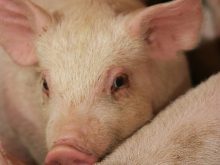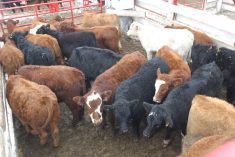CHICAGO (Reuters) – U.S. ranchers in July placed 2.7 percent more cattle in U.S. feedlots than a year ago, but fell short of average analysts’ forecasts.
Dwindling profits for feedyards, reflecting weaker fed cattle prices, discouraged them from buying calves for fattening, said analysts following the U.S. Department of Agriculture cattle on feed report Aug. 25.
Ranchers had expected lower prices by late summer and earlier this year were rushing cattle to market to beat the downturn.
Cattle that entered feedlots in July could begin arriving at packing plants in early 2018.
Read Also

Critical growing season is ahead for soybeans
What the weather turns out to be in the United States is going to have a significant impact on Canadian producers’ prices
Chicago Mercantile Exchange cattle futures open higher in the trading session after the report, reflecting the bullish placement outcome.
USDA’s report showed July placements at 1.615 million head, up from 1.572 million a year earlier and below the average forecast of 1.670 million.
Still, it was the largest July placement figure since 1.684 million in 2013.
The feedlot cattle supply as of Aug. 1 was 10.604 million head, up 4.3 percent from 10.165 million a year ago. Analysts, on average, forecast a 4.7 percent increase.
The number of cattle sold to packers, or marketings, were up 4.1 percent in July from a year ago, to 1.784 million head. Analysts expected a gain of 4.9 percent from 1.713 million last year.
“Cattle feeders are facing clear losses in the months ahead due to their very heavy placement schedule in the previous eight months,” said Allendale Inc. chief strategist Rich Nelson.
The Denver-based Livestock Marketing Information Center calculated that feedlots in July, on average, made a profit of US$40 per steer sold versus $84 the month before.
They project August margins at minus $20 per head.
Friday’s report will ease some concerns about supplies during the first half of 2018, but does not change the outlook for significant cattle numbers during the fall, said Nelson.

















